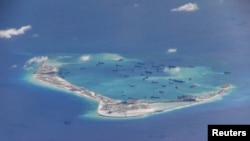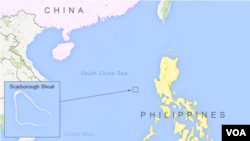On Friday's independence day holiday in the Philippines, hundreds of leftist protesters decried China’s claims to most of the South China Sea. But the various groups opposed to China do not agree on whether they should rely on the United States as a deterrent to China’s increasing assertiveness.
A theme song calling on Filipinos to standup for themselves against China blared as about 500 protesters marched under the baking sun on the street in front of the Chinese consular office in Metro Manila.
The protesters, who call themselves “One for Philippine Sovereignty,” want China’s surveillance vessels and island-making dredging ships out of the 370-kilometer exclusive economic zone that bounds their country’s coastline.
China claims almost all of the resource-rich sea. The Philippines, Vietnam, Malaysia, Brunei and Taiwan also have competing claims.
New Alliance Party Secretary General Renato Reyes says China must “stop undermining” Philippine sovereignty.
“We may be a small country, but our people will fight back, will stand up against any form of foreign intervention either by the Chinese or by the United States," said Reyes. "We want a truly independent Philippines, one that is not dictated upon or undermined by any foreign power.”
China's military outposts
Beijing is using scores of industrial dredging ships in the South China Sea to build up artificial islands that can act as landing strips and bases for military outposts. The moves have drawn sharp criticism from U.S. and Philippine officials who have voiced concern that Beijing could move to limit freedom of navigation in waters crucial to international shipping.
Analysts say the majority of the Philippine public favors maintaining ties with the U.S. in the face of China’s more assertive presence in the sea. But groups like Reyes’ remain wary of such alliances, and oppose Manila’s mutual defense treaty with Washington. Reyes holds faith in Manila’s pending arbitration case against Beijing, which questions what it calls Beijing’s “excessive claims” in the sea.
'Indesputable sovereignty'
China rejects arbitration and is not participating in the pending case. It says it has “indisputable sovereignty” over the sea’s waters and its hundreds of outcroppings.
Roilo Golez, former Philippine National Security Advisor, heads another group called “No to subjugation,” which followed the earlier protest at the consulate. This set of protesters is pushing for alliances with countries to help shore-up Manila’s position.
Golez says there is no such thing as an independent foreign policy, like what the other group is calling for, especially when the Philippines with a tiny military budget “is confronted with a giant," said Golez.
“And in a situation like this where we have common interests it’s normal to form alliances. The common interest is that we want the South China Sea to be a common area, not to be a private lake of China. There should be freedom of navigation there. They should not encroach on our exclusive economic zone.”
Authorities in Manila this week are also releasing a three-part documentary on the South China Sea aimed at defending their claims to waters rich in marine life and energy resources.






